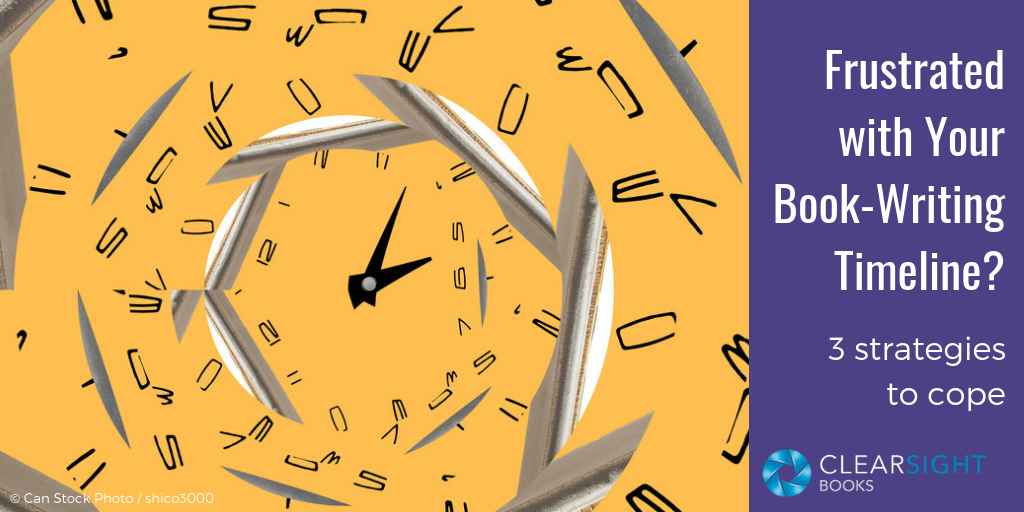 I frequently get the question “How long should it take to write a book?” And I answer, as all good consultants do, “It depends.” I’ve seen clients write books in as little as six weeks or take as long as several years.
I frequently get the question “How long should it take to write a book?” And I answer, as all good consultants do, “It depends.” I’ve seen clients write books in as little as six weeks or take as long as several years.
Factors that influence book-writing timelines
A couple of factors can help estimate “longer” or “shorter”—and one big factor can make estimates meaningless.
Factor 1: How well defined your topic is
Consider where your book falls on the spectrum of self-contained to emergent.

In self-contained writing, the content is well defined. It is often familiar to you, and can be outlined in a fair amount of detail. It may be a topic you speak, train, or consult on regularly. The boundaries are set.
Emergent writing, on the other hand, is more organic. You begin with an idea and a rough roadmap, but aren’t sure exactly where you’re going. It’s often your first time trying to articulate your concepts in depth; as you write, ideas evolve and structures morph.
Generally speaking, the more self-contained your topic is, the easier—thus faster—it is to write. The more emergent, the more wandering you may need to find your path.
Factor 2: Your butt-in-chair discipline
Let’s face it—writing a book is work. You’ve got to put your butt in the chair and type. Or scribble in your notebook. Or record your thoughts. Whatever your writing process is, you have to actually do it. And the more consistent you are about getting words on the page, the faster your book-writing process goes.
Factor 3: The creative process
Even with clearly defined content and consistent writing habits, the creative process can throw you for a loop. Why? Because the creative process is unpredictable.
When you begin writing, you learn new things. You find that your words don’t capture your ideas adequately, at least not in their initial form. With all due respect to Yoda, you have to try, try again—which takes time.
I had two projects of comparable length—one, straightforward nonfiction with loads of content to draw on, the other, fiction with only a rough outline. My prediction was that the fiction would take longer due to the nature of the writing. I was wrong.
The books took a comparable duration (a span of several months), but the nonfiction took twice as many butt-in-chair hours. The first two drafts of the nonfiction just didn’t sing; they needed significant revision. The fiction required more breathing space between drafts, but many fewer hours in the chair.
Something in the creative process will take you by surprise. It is predictably unpredictable—which means the answer to “How long should it take to write my book?” is “It depends.”
Dealing with book-writing timeline frustration
The creative process can be frustrating, but it is what it is. Maintain your timeline equilibrium with a few simple strategies.
Strategy 1: Set low expectations
“Set low expectations” sounds like horrible advice, doesn’t it?! I don’t mean lower your expectations for quality, but rather lower your expectations for how fast you can move. Anticipate setbacks and rework, so when they happen, you’re not surprised.
Back when I was in the corporate IT project world, we used to estimate project timelines using a formula:
((1 * best case) + (4 * expected case) + (1 * worst case)) ÷ 6
For book writing I’d modify that:
((1 * (best case) + (2 * expected case) + (3 * worst case)) ÷ 6
Set low expectations—when you exceed them, you’ll be ecstatic.
Strategy 2: Hedge your bets
Some people will advise you to set a hard launch date for your book. If you work best with a deadline, that may be a good approach. If missing an announced deadline gives you agita, I suggest hedging your bets. Hold off on announcing dates until they become clear to you, or build in some wiggle room. Rather than “Coming October 1!” say “Coming this fall!”
Strategy 3: Surrender to the process
You might find the first two strategies somewhat flip (or practical!). But here’s my most serious and maybe most important piece of advice: Surrender. As creativity guru Julia Cameron writes, “The creative process is a process of surrender, not control.”
When I say surrender, I don’t mean collapse. I don’t mean avoid forward motion.
I mean accept that setbacks are part of the game. Accept that your gut is telling you your book still doesn’t work. Acknowledge that rework could cause your timeline to go awry. Accept that beta reader feedback might delay you further.
I said it was a simple strategy, but that doesn’t make it easy.
You will feel frustrated at times, no doubt. But surrendering to the process, to the extent you find possible, will allow you to proceed with patience, steadfastness, and grace.
How long will it take you to write your book? It depends. But trust that you will get it done.
You will get it done.

